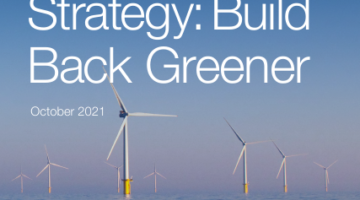
Following a look at Labour’s new manifesto yesterday, we thought we’d take a look at the Conservatives’. There’s a lot more detail in regards to energy policies in the Conservatives’ offering – but it doesn’t really offer anything new. One of six main promises on the first page of the manifesto is ‘competitive and affordable energy costs’, and there are some promising suggestions for how to implement this, but very little about environmental measures. There is a failure to diversify around from fossil fuels,an insistence on fracking despite public opposition, and a lot of recycled old ideas.
Energy generation
The Conservatives set out their ultimate stance on energy in one key sentence:
‘Above all, we believe that energy policy should be focused on outcomes rather than the means by which we reach our objectives. So, after we have left the European Union, we will form our energy policy based not on the way energy is generated but on the ends we desire.’
In other words, the amount of energy produced, and the profit arising from it, is more important than reducing environmental impact. Like Labour’s, Conservative energy policy centres mainly on nuclear and gas, but with a few key differences, such as its insistence on the benefits of fracking. The manifesto talks a lot about nuclear, oil and gas in terms of ‘protect[ing] our critical national infrastructure.’ It then goes on to assert that the Conservatives will be careful about ‘foreign ownership of companies controlling important infrastructure’, and mentions nuclear power as an example. This is pretty ironic, considering the fact that Hinkley Point C, the UK’s new nuclear plant in production, is owned by EDF! The Conservatives also promise to ‘continue to support the [North Sea oil and gas] industry and build on the unprecedented support already provided to the oil and gas sector.’
There’s a section on creating a ‘diverse energy mix’, but the only new energy source mentioned is fracking, which it gushes about. The manifesto talks about the ‘revolution’ brought by fracking in the US, driving down prices and reducing reliance on imported energy. It justifies the expansion of fracking by saying shale is cleaner than coal. This might be true – but it could hardly be claimed as a ‘green’ method of energy production – and it’s irrelevant considering coal will no longer be used in the UK by 2025.
The idea expressed that they ‘will only be able to do so if we maintain public confidence in the process’ is a bit of a joke considering the UK public’s huge concerns about the potential environmental and health impacts of the technology. They are in fact intending to circumnavigate public and legal opposition by changing planning law for shale applications. ‘Non-fracking drilling will be treated as permitted development’, and they will take power over the decision away from local councils, to reduce pressure. Perhaps the most worrying part of these plans is to give ‘tax revenues to shale gas back to the communities that host extraction site, plus the option of ‘payments to be made directly to local people themselves.’ It rings alarm bells that the Conservatives believe they will need to placate people by paying them, to offset their concerns.
Solar power is not mentioned at all, and wind just once, asserting that only offshore wind will be invested in.
Energy poverty
The manifesto acknowledges the increasing stress that rising energy prices are causing for those on the poverty line. It promises to make energy ‘affordable’, stating an ambition to make the UK’s energy costs the lowest in Europe. The manifesto promises the party ‘will therefore commission an independent review into the Cost of Energy, which will be asked to make recommendations as to how we can ensure UK energy costs are as low as possible, while ensuring a reliable supply and allowing us to meet our 2050 carbon reduction objective.’ (It’s worth mentioning that this is the only reference to reducing carbon in the entire document)…
The manifesto explains the common misconception that people believe they will be rewarded by choosing one of the big energy companies because they have heard of them – and for being loyal. It states that a lot of people – and especially the vulnerable – do not know that they could get a much better deal by changing supplier. It says it will maintain competition for energy companies by ‘supporting initiatives to make the switching process easier and more reliable’, while protecting those who don’t switch by introducing an energy price cap, limiting the amount energy companies can charge consumers. It’s nice to hear the strong words about ‘abusive price changes’, but it’s tempting to wonder why they’ve never done anything about it until now…
The manifesto also mentions the rollout of smart meters to hopefully give people more control over their energy bills. It says it concentrate on energy efficiency in buildings, reviewing building regulations as well as upgrading all existing fuel poor homes to EPC Band C by 2030. However, it doesn’t say how it will do this, or whether homeowners and tenants will carry the cost. It seems contradictory considering the current Conservative government axed the Green Deal and other incentives for home efficiency improvements.
Environment
The manifesto’s approach to environmental issues is, like Labour’s, contradictory. Considering the Conservatives’ continued support of fossil fuels, and the fact the word ‘renewable’ doesn’t appear once in the whole document, it’s hard to see their grounding for claiming to uphold ‘rigorous environmental protections’. They’ve arguably shown very little commitment to environmental stuff since being elected (slashing home renewables subsidies, not meeting air pollution targets, not investing in renewables…). They state that ‘As Conservatives, [they] are committed to leaving the environment in better condition than [they] inherited it.’ It then misleadingly makes a point of the UK being the first country to introduce a Climate Change Act, conveniently failing to mention that it was a Labour government (2008) that brought it in.
The manifesto promises Conservatives will to take measures ‘to prevent catastrophic environmental degradation’ but doesn’t mention any specifics – and it’s pretty unconvincing on reducing carbon emissions too.
It mentions the leaving the European Union as an opportunity to ‘take control of our environmental legislation again.’ Leaving environmental legislation in the hands of the same government who have routinely evaded their responsibilities when it comes to improving the UK’s air quality isn’t a very tempting idea.
A last word on Conservative energy policy…
There are elements of the Conservative manifesto that sound convincing. If they delivered all their promises (especially in regards to cutting energy prices), it would be quite impressive – but would they, and what would the environmental cost be? There is an uncomfortable recurring theme of profit over environment throughout. There’s no focus on renewables, and you might also question why, if they care about consumers’ energy bills so much, they’ve let the problem get worse during their 7 years in power.
The bottom line is that ensuring security of energy supply and reducing carbon emissions don’t seem to be priorities for either of the two biggest political parties in the UK!
Think we missed something? Do you have a different opinion?
Comment below to get your voice heard…












No Comments yet! Be the first one.